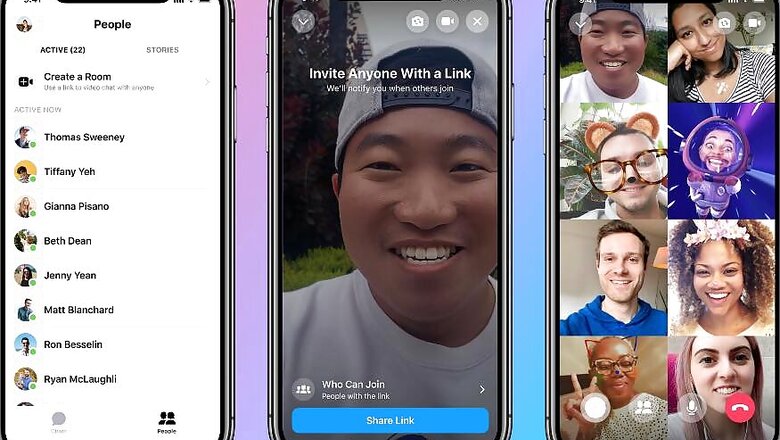
views
WhatsApp and mind-boggling numbers go hand in hand. As of February, WhatsApp had crossed 2 billion users worldwide. It is by far the most popular instant messaging app in the world, followed by its own sibling, Facebook Messenger. Chances are everyone you know is using WhatsApp. It is to instant messaging what Xerox is to photocopying. That being said, Facebook isn’t about to let a low hanging fruit get away. WhatsApp could very well be in the prime position to become the default name for the video calling, group calling and video meeting requirements for millions around the world. While the competition remains busy trying to compete with each other.
Look at the traction that the Coronavirus pandemic has translated into. Zoom clarified and said they clocked 300 million users in April. Houseparty, an app owned by Fortnite developer Epic Games, clocked more than two million downloads in early March, as the first stages of the lockdown around the world kicked in. Facebook says video-calling on Messenger had straight doubled since last year. Microsoft has said that there are more than 200 million meeting participants in a single day in April, and there were more than 4.1 billion meeting minutes generated. Teams now has more than 75 million daily active users, confirmed Microsoft CEO Satya Nadella.
Messenger Rooms is one part of the plan
It was just last month that Facebook CEO Mark Zuckerberg had said how as many as 700 million users around the world are using Messenger and WhatsApp for calls. That’s voice calls and video calls to colleagues, friends and family. It is not surprising then that Facebook wants to do everything to not only keep this user base engaged, but also away from rivals such as Zoom, Google Meet, Skype and others. That would be true for the business use case and for personal users as well. What arrived on the scene was Messenger Rooms. It allows a maximum of 50 participants in a group video call. That’s the same limit as Skype’s Skype Now. Even though Zoom offers the ability to get 100 people to join as part of the free subscription tier, WhatsApp has the added advantage of familiarity, almost everyone has it and well, Zoom has been haunted by privacy issues for a while now.
The fact is that Messenger Rooms is so versatile, you can start or join a Rooms chat from Messenger, Facebook, Instagram Direct, WhatsApp, or even the Portal smart display. That is the power and extent of Facebook’s ecosystem of apps truly making their presence felt.
The thing is, when we talk of video calling apps and video conferencing solutions, we immediately visualize a meeting that has 100+ people, all trying to get their message across as part of a corporate jamboree. That is not always the case. More often than not, it is smaller teams that need to connect, for a quick brainstorming session, for a status update, quick guidance or simply to drop in and say hello. For that to work, it is just clunky and ostentatious to have to set up a meeting, share a meeting link and a password and download a separate app on your phone or PC.
Simplicity is what really is WhatsApp’s strongest point here. It is as simple as picking up your phone or opening WhatsApp web, ticking off the list of contacts you want in the meeting and making a call. You spend lesser time on the riffraff. Be it for the Messenger Rooms or for the now more-powerful Group calling.
Group Video Calls are equally brilliant for work and fun
A few days ago, a new update for WhatsApp for Android phones and the Apple iPhones landed with the more powerful group calling feature. Instead of 4, you can now get 8 people on a group voice or video call. “Over the last month, people on average are spending over 15 billion minutes talking each day on WhatsApp calls, well above a typical day before the pandemic, WhatsApp had said at the time. More friends can be part of the social distancing catch-up. More colleagues can join in and share brilliant ideas on how to go about things. This will work even on Android phones or iPhones that are old and not as powerful anymore—it is priceless for those who may still be rocking older smartphones. The same flexibility cannot exactly be vouched for, for the other video meeting apps. Except perhaps FaceTime, which works brilliantly on all iPhones, no matter how old.
All that being said, it is still lesser than 32 participants that Apple FaceTime allows, the 12-person limit that Google Duo now has and Skype which supports 50 participants. If that really a limitation? Perhaps not.
End to End Encryption remains its strongest suite
If you don’t really want a scenario where the privacy of your calls is not exactly a certainty and the promises sound a bit dodge, chances are you’ll stay away from Zoom. In that regard, WhatsApp has pushed the end-to-end encryption capabilities extensively over time. “And just like written messages, all those calls are protected with end-to-end encryption,” they did the same with the new group calling too.
In fact, Messenger Rooms will also have end-to-end encryption enabled for all calls. Simply put, it makes it extremely unlikely that anyone will able to eavesdrop on your conversation as it traverses the depths of the world wide web, without your knowledge.
With Rooms and Group Calling, Facebook’s idea is simple. It is not to try and be the platform that tries to appeal to casual users, small groups, smaller teams, medium sized meetings and large enterprises—basically redevelop the app to a one-size fits all. It is to be versatile enough for different use cases, and that is where the volumes could very well be.
WhatsApp builds from a foundation of strength. It has a massive user base, like no other. It has usage statistics and insights that tell exactly how people use video calling and group calling features. It has something for pretty much everyone now.
Ads in WhatsApp are coming, no two ways about it
While WhatsApp is like no other instant messaging app in the world, it does have one glaring shortcoming. From the business side of things. It doesn’t make money for Facebook. It has to be monetized at some stage. That is how a business makes financial sense. There has been talk for a while now that ads would eventually make their way into the WhatsApp app. It hasn’t happened so far, but don’t bet on the status quo for too long. Ads in WhatsApp Status could be the start. How Facebook manages opening doors to its platform for advertisers and yet be able to secure user data privacy is a matter for another debate.
That is where Facebook’s plan to unify WhatsApp, Messenger and Facebook with one encryption platform could help.
WhatsApp Pay could provide the big boost
Last but not least is the final piece of the jigsaw for WhatsApp. Digital payments. This will be particularly good in developing economies such as India, where mobile based payments are a big deal. The much-awaited UPI mobile payments service got the approvals from the National Payments Corporation of India (NPCI) in February, for what will be a phased roll-out. The first phase will mean 10 million users. This will also fit in perfectly with the Government of India’s push for digital payments, as part of the Digital India mission.


















Comments
0 comment